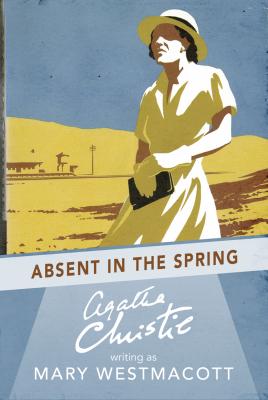Absent in the Spring. Агата Кристи
Читать онлайн.| Название | Absent in the Spring |
|---|---|
| Автор произведения | Агата Кристи |
| Жанр | Классическая проза |
| Серия | |
| Издательство | Классическая проза |
| Год выпуска | 0 |
| isbn | 9780007534982 |
HarperCollinsPublishers Ltd
1 London Bridge Street
London SE1 9GF
First published in Great Britain by Collins 1944
Copyright © 1944 Rosalind Hicks Charitable Trust. All rights reserved.
Cover by ninataradesign.com © HarperCollins 2017
Agatha Christie asserts the moral right to be identified as the author of this work.
A catalogue copy of this book is available from the British Library.
This novel is entirely a work of fiction. The names, characters and incidents portrayed in it are the work of the author’s imagination. Any resemblance to actual persons, living or dead, events or localities is entirely coincidental.
All rights reserved under International and Pan-American Copyright Conventions. By payment of the required fees, you have been granted the non-exclusive, non-transferable right to access and read the text of this e-book on screen. No part of this text may be reproduced, transmitted, down-loaded, decompiled, reverse engineered, or stored in or introduced into any information storage and retrieval system, in any form or by any means, whether electronic or mechanical, now known or hereinafter invented, without the express written permission of HarperCollins.
Source ISBN: 9780008131432
Ebook Edition © June 2017 ISBN: 9780007534982
Version: 2018-04-11
From you have I been absent in the Spring …
Contents
Copyright
Dedication
Chapter 1
Chapter 2
Chapter 3
Chapter 4
Chapter 5
Chapter 6
Chapter 7
Chapter 8
Chapter 9
Chapter 10
Chapter 11
Chapter 12
Epilogue
Also by Agatha Christie
About the Publisher
Joan Scudamore screwed up her eyes as she peered across the dimness of the rest house dining-room. She was slightly short-sighted.
Surely that’s—no it isn’t—I believe it is. Blanche Haggard.
Extraordinary—right out in the wilds—to come across an old school friend whom she hadn’t seen for—oh quite fifteen years.
At first, Joan was delighted by the discovery. She was by nature a sociable woman, always pleased to run across friends and acquaintances.
She thought to herself, But, poor dear, how dreadfully she’s changed. She looks years older. Literally years. After all, she can’t be more than—what, forty-eight?
It was a natural sequence after that to glance at her own appearance in the mirror that happened, most conveniently, to hang just beside the table. What she saw there put her in an even better humour.
Really, thought Joan Scudamore, I’ve worn very well.
She saw a slender, middle-aged woman with a singularly unlined face, brown hair hardly touched with grey, pleasant blue eyes and a cheerful smiling mouth. The woman was dressed in a neat, cool travelling coat and skirt and carried a rather large bag containing the necessities of travel.
Joan Scudamore was travelling back from Baghdad to London by the overland route. She had come up by the train from Baghdad last night. She was to sleep in the railway rest house tonight and go on by car tomorrow morning.
It was the sudden illness of her younger daughter that had brought her post haste out from England, her realization of William’s (her son-in-law) impracticability, and of the chaos that would arise in a household without efficient control.
Well, that was all right now. She had taken charge, made arrangements. The baby, William, Barbara convalescent, everything had been planned and set in good running order. Thank goodness, thought Joan, I’ve always had a head on my shoulders.
William and Barbara had been full of gratitude. They’d pressed her to stay on, not to rush back, but she had smilingly, albeit with a stifled sigh, refused. For there was Rodney to consider—poor old Rodney stuck in Crayminster, up to his ears in work and with no one in the house to look after his comfort except servants.
‘And after all,’ said Joan, ‘what are servants?’
Barbara said:
‘Your servants, Mother, are always perfection. You see to that!’
She had laughed, but she had been pleased all the same. Because when all was said and done one did like appreciation. She had sometimes wondered if her family took a little too much for granted the smooth running of the house and her own care and devotion.
Not really that she had any criticism to make. Tony, Averil and Barbara were delightful children and she and Rodney had every reason to be proud of their upbringing and of their success in life.
Tony was growing oranges out in Rhodesia, Averil, after giving her parents some momentary anxiety, had settled down as the wife of a wealthy and charming stockbroker. Barbara’s husband had a good job in the Public Works Department in Iraq.
They were all nice-looking healthy children with pleasant manners. Joan felt that she and Rodney were indeed fortunate—and privately she was of the opinion that some of the credit was to be ascribed to them as parents. After all, they had brought the children up very carefully, taking infinite pains over the choice of nurses and governesses, and later of schools and always putting the welfare and well-being of the children first.
Joan felt a little gentle glow as she turned away from her image in the glass. She thought, Well, it’s nice to feel one’s been a success at one’s job. I never wanted a career, or anything of that kind. I was quite content to be a wife and mother. I married the man I loved, and he’s been a success at his job—and perhaps that’s owing to me a bit too. One can do so much by influence. Dear Rodney!
And her heart warmed to the thought that soon, very soon, she would
